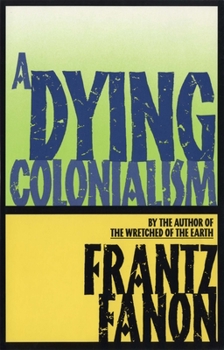A Dying Colonialism
Select Format
Select Condition 
Book Overview
Frantz Fanon's seminal work on anticolonialism and the fifth year of the Algerian Revolution. Psychiatrist, humanist, revolutionary, Frantz Fanon was one of the great political analysts of our time, the author of such seminal works of modern revolutionary theory as The Wretched of the Earth and Black Skin, White Masks. He has had a profound impact on civil rights, anticolonialism, and black consciousness movements...
Format:Paperback
Language:English
ISBN:0802150276
ISBN13:9780802150271
Release Date:January 1994
Publisher:Grove Press
Length:181 Pages
Weight:0.52 lbs.
Dimensions:0.5" x 5.3" x 8.1"
Customer Reviews
2 ratings
A Voice of the Voiceless
Published by Thriftbooks.com User , 18 years ago
"A Dying Colonialism" is one of the lesser known books by Franz Fanon, the other better known works being "Black Shin, White Masks"-"Peau noir, masques blancs" (1952) and "The Wretched of the Earth" - "les damn?s de la terre (1961)". Fanon was born on the French colony of Martinique, a descendant of African slaves, who had been brought to the Caribbean to work on the island's sugar plantations. In this book, Fanon espouses his beliefs and ideas that it is only through violent revolution that colonial repression and cultural trauma in the Third World can be ended. He argued that violence is a cleansing force which frees the native from his inferiority complex and from his despair and inaction, making him fearless and restoring his self-respect. In his teenage years, Fanon was politically active and participated in the guerrilla struggle against the supporters of the pro-Nazi French Vichy government. He served in the Free French forces. After the war he studied medicine and psychiatry in Paris and Lyons. Fanon argued that white colonialism imposed an existentially false and degrading existence upon its black victims to the extent that it demanded their conformity to its distorted values. The colonized is not seen by the colonizer a human being; this is also the picture the colonized is forced to accept. In 1954 the Algerian National Liberation Front (FLN) started its open warfare against French rule. In 1957 Fanon joined the Algerian liberation movement that sought to throw off French rule. Fanon traveled guerrilla camps, hid terrorists at his home and trained nurses to dress wounds. In 1959 he was severely wounded on the border of Algeria and Morocco. Fanon then worked briefly as an ambassador of the provisional Algerian government to Ghana and edited in Tunisia the magazine "Moudjahid". Fanon distinguished himself as revolutionary writer, whose writings had profound influence on the anti-colonial as well as revolutionary movements in the 1950s and 1960s not only in third world countries but also in the United States and Europe. Fanon himself died in 1961 and could not witness Algeria's independence.
Frantz Fanon: Voice of the Third World
Published by Thriftbooks.com User , 25 years ago
To Frantz Fanon, scientist, revolutionary, hero, belongs the most eloquent voice of the era of decolonization. What is striking about the writing of Fanon is its beauty even in translation. Its compassionate humanism shines through even when he calls for armed struggle against the torturers and executioners of French imperialism.This book was originally published, I believe, as "Year Five of the Algerian Revolution." This revolution, which beganon Nov. 1, 1954 and ended in 1962, became the archetype of anti-colonial revolt purely as a result of Fanon's record of it.Unfortunately, the Algerian, who had suffered under French domination for 130 years, was outmatched --- but not hopelessly outmatched --- by the French occupying forces. Over 1 million Algerians died in the struggle to give birth to a free Algeria, but only 15000 French soldiers. Fanon writes about the cultural transformations that occurred --- that HAD to occur --- to give fighting Algeria a fighting chance.Westerners often criticize the Arab world for its allegedly sexist treatment of women. Critics often use the veil as a metaphor for this "oppression." French colonizers, whose goal was the complete destruction of Algerian culture, often used the veil to create a rift in Algerian society. They did so by trying to Europeanize Algerian women --- getting them to cast away the veil and wear make-up and immodest dress --- and by forcing Algerian men bring their wives with them to social functions, taboo in Algerian society.Fanon shows how the revolution not only healed the rift between the traditional Algerian patriarch and the "modern" woman, but created a new culture with new, non-sexist, values.For instance, the traditionalist Algerian woman, in the course of the revolution, learned to leave the home, alone, even to doff the hajib, in order to pose as a "modern" woman who could fool the French into thinking she was not a spy for the mujahidin. The "modern" woman, conversely, could come back into the fold by wearing the hajib. The French, thinking her harmless, would not realize that, under her garments, she carried supplies for the rebels.Fanon also talks about how the Algerian's attitude toward modern medicine and modern technology, seemingly backward to the French, changed completely when these instances of modernity ceased to represent French colonialism, but became instruments of Algerian self-determination."A Dying Colonialism" is not as gripping as Fanon's other three books, but is nonetheless a classic.





